
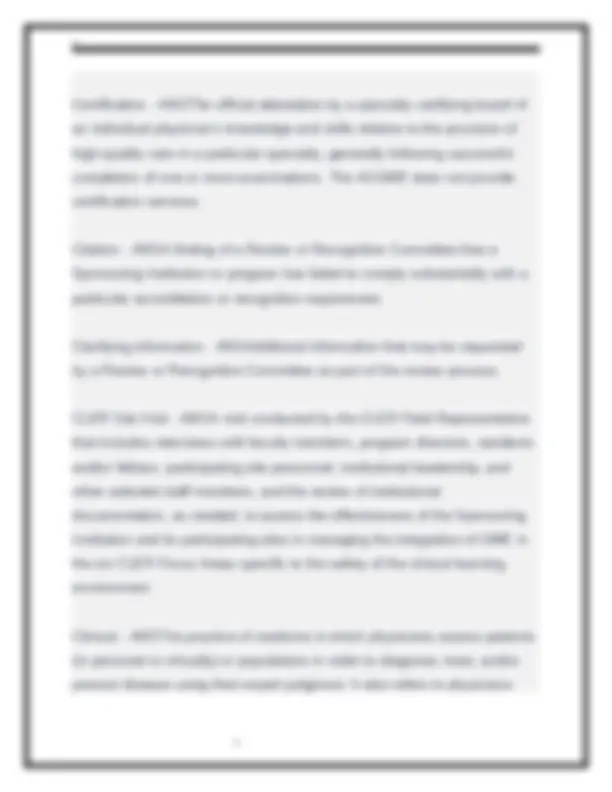
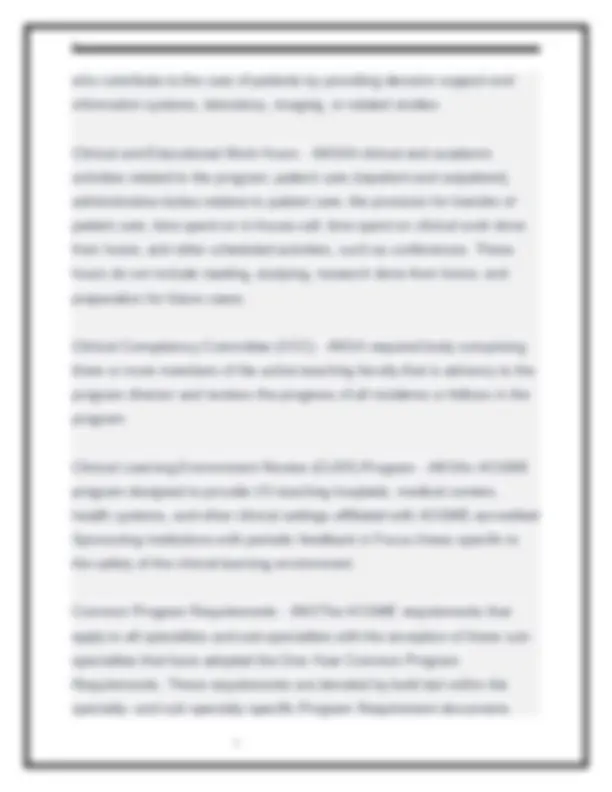
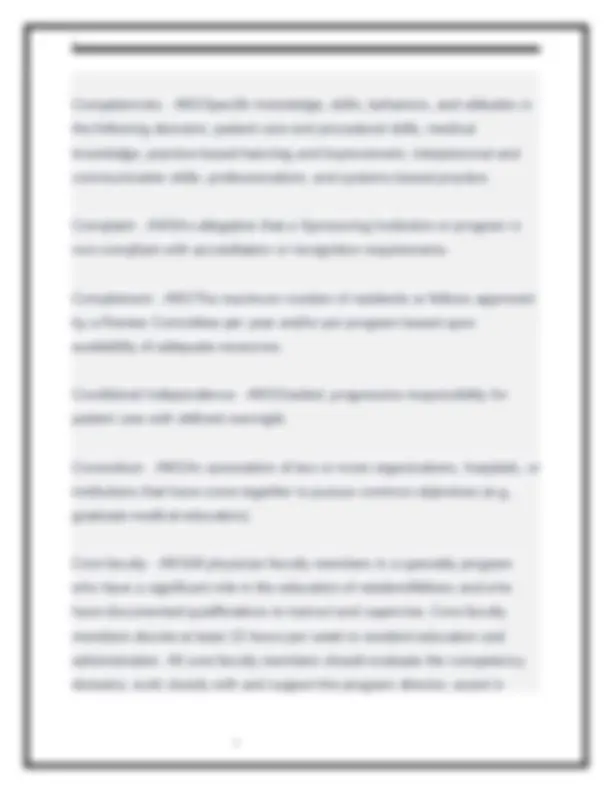
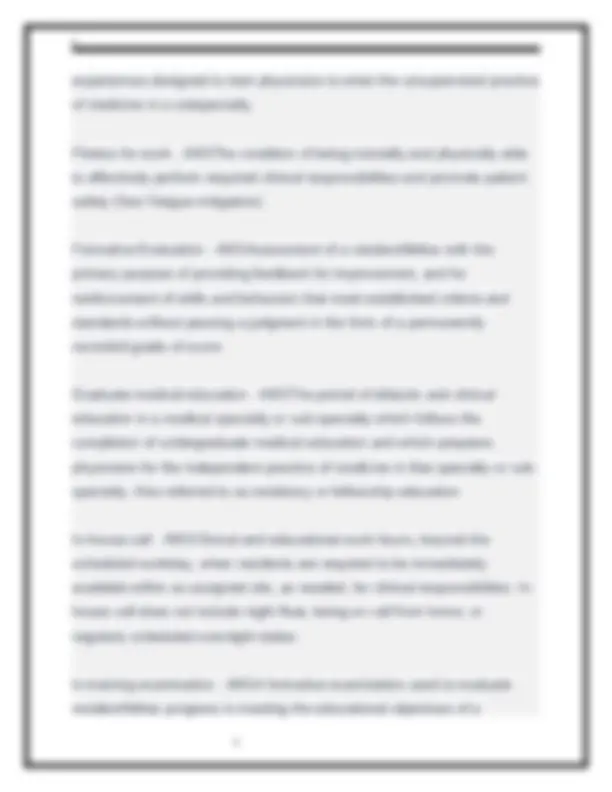
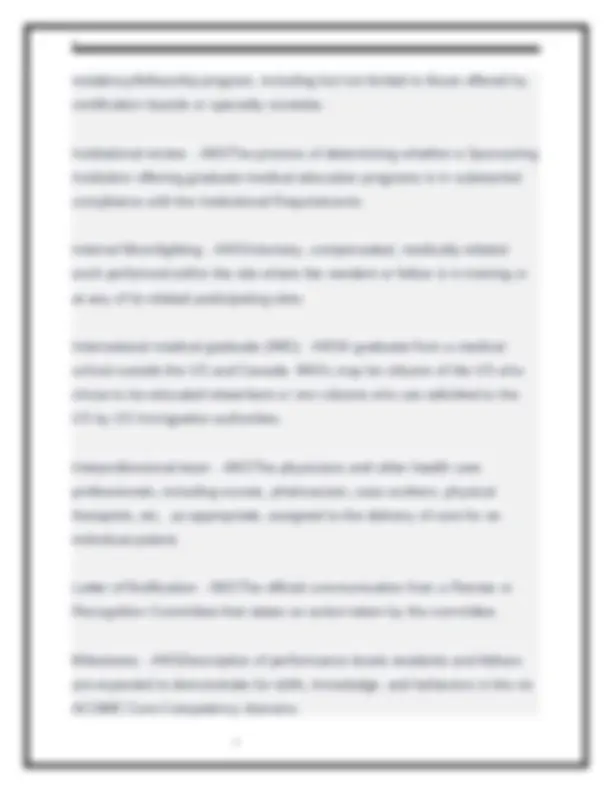
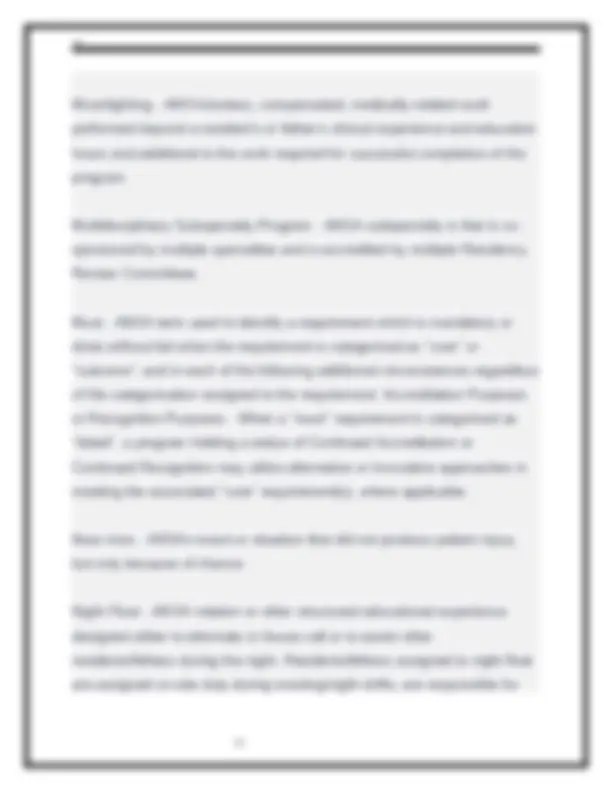
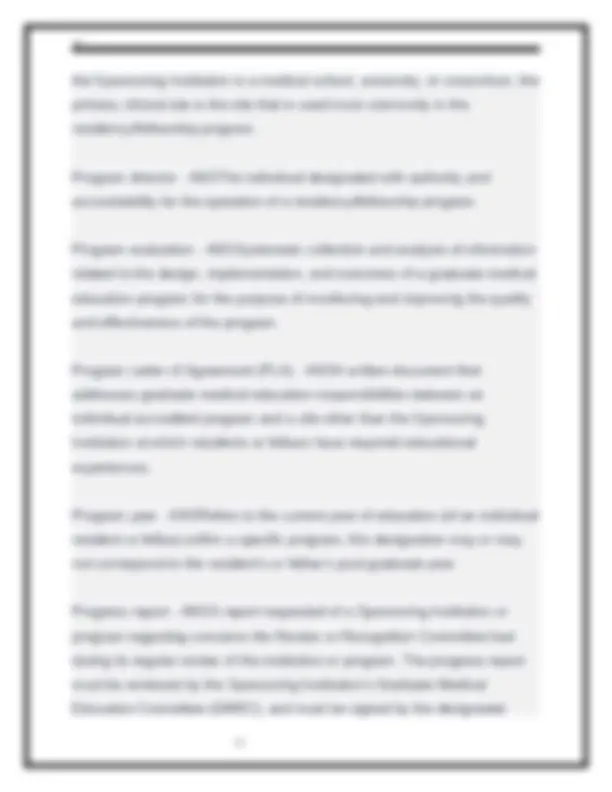
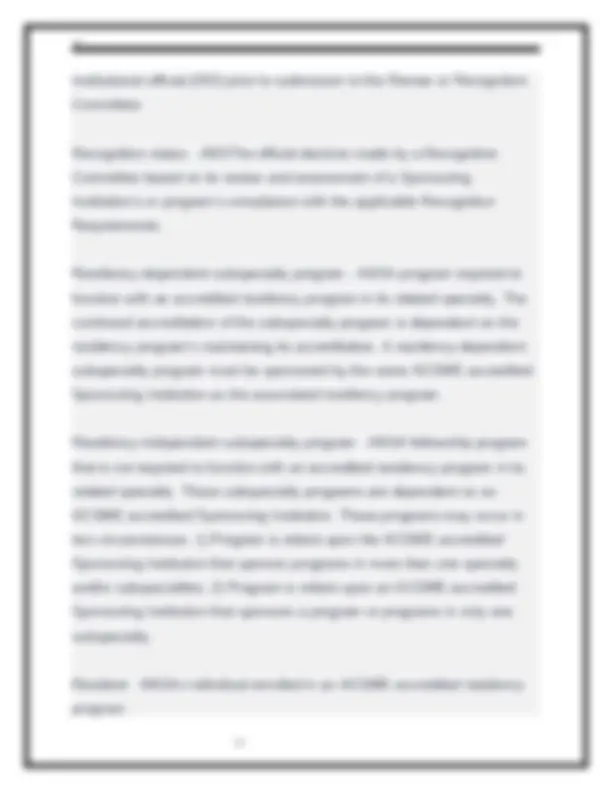
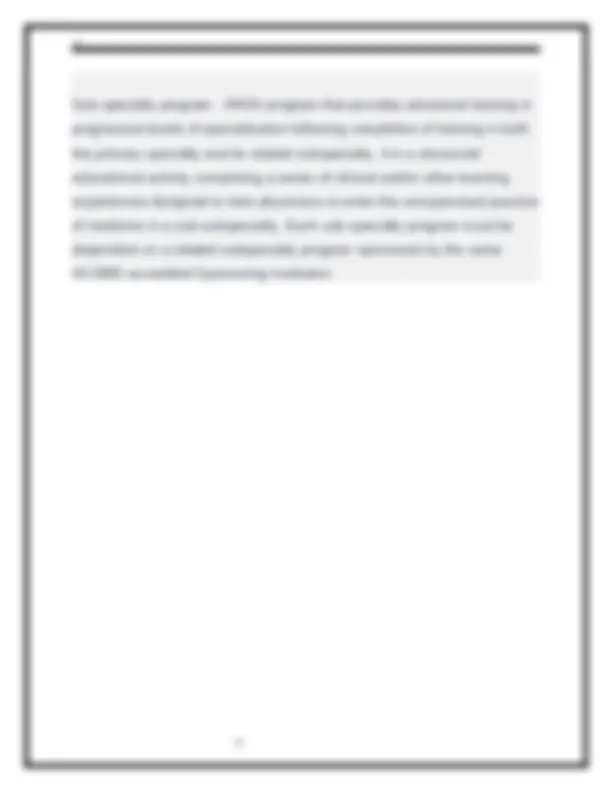


Study with the several resources on Docsity

Earn points by helping other students or get them with a premium plan


Prepare for your exams
Study with the several resources on Docsity

Earn points to download
Earn points by helping other students or get them with a premium plan
Community
Ask the community for help and clear up your study doubts
Discover the best universities in your country according to Docsity users
Free resources
Download our free guides on studying techniques, anxiety management strategies, and thesis advice from Docsity tutors
TAGME TEST NEWEST EDITION 2025-2026. QUESTIONS & CORRECT VERIFIED ANSWERS. GRADED A
Typology: Exams
1 / 15

This page cannot be seen from the preview
Don't miss anything!










Accreditation Data System (ADS) – ANS A web-based software system to collect, organize, and maintain information for accreditation and recognition purposes, and a means of communication between the ACGME and Sponsoring Institutions and programs. Accreditation status – ANS The official decision made by a Review Committee based on its review and assessment of a Sponsoring Institution's or program's compliance with the applicable requirements. (See appendix) Advancing Innovations in Residency Education (AIRE) - ANSA pilot program with the dual aims of 1)enabling the exploration of novel approaches and pathways in GME, and 2) enhancing the attainment of educational and clinical outcomes through innovative structure and processes in resident and fellowship education. Adverse action - ANSA Review or Recognition Committee's decision to confer an adverse accreditation or recognition status on a Sponsoring Institution or program (i.e., Accreditation Withheld, Probationary Accreditation, Withdrawal of Accreditation, Withdrawal of Accreditation Under Special Circumstances, and non-voluntary Reduction in Resident Complement).
Adverse event - ANSAn injury that was caused by medical management (rather than the underlying disease), and that prolonged hospitalization, produced a disability at the time of discharge, or both. Alleged egregious event - ANSThe occurrence of an alleged accreditation violation affecting a Sponsoring Institution or program determined by the President and Chief Executive Officer of the ACGME to be of sufficient importance and urgency to require a rapid response. Applicant - ANSAn individual invited to interview with a GME program At-home call (pager call) - ANSCall taken from outside the assigned site. Clinical work done while on at-home call, including time spent in the hospital and work done at home, such as taking calls or entering notes in an EHR, counts against the 80-hour-per-week limit but does not restart the clock for time off between scheduled in-house clinical and educational work periods. The remaining time, free of clinical work, does not count. At-home call may not be scheduled on a resident's or fellow's one free day per week (averaged over four weeks). Attending physician - ANSThe single identifiable physician ultimately responsible and accountable for an individual patient's care, who may or may not be responsible for supervision residents or fellows. Categorical resident - ANSA resident who enters a program and has the objective of completing the entire program.
who contribute to the care of patients by providing decision support and information systems, laboratory, imaging, or related studies. Clinical and Educational Work Hours - ANSAll clinical and academic activities related to the program; patient care (inpatient and outpatient); administrative duties relative to patient care; the provision for transfer of patient care; time spent on in-house call; time spent on clinical work done from home; and other scheduled activities, such as conferences. These hours do not include reading, studying, research done from home, and preparation for future cases. Clinical Competency Committee (CCC) - ANSA required body comprising three or more members of the active teaching faculty that is advisory to the program director and reviews the progress of all residents or fellows in the program. Clinical Learning Environment Review (CLER) Program - ANSAn ACGME program designed to provide US teaching hospitals, medical centers, health systems, and other clinical settings affiliated with ACGME-accredited Sponsoring Institutions with periodic feedback in Focus Areas specific to the safety of the clinical learning environment. Common Program Requirements - ANSThe ACGME requirements that apply to all specialties and sub-specialties with the exception of those sub- specialties that have adopted the One-Year Common Program Requirements. These requirements are denoted by bold text within the specialty- and sub-specialty-specific Program Requirement documents.
Competencies - ANSSpecific knowledge, skills, behaviors, and attitudes in the following domains: patient care and procedural skills; medical knowledge; practice-based learning and improvement; interpersonal and communication skills; professionalism; and systems-based practice. Complaint - ANSAn allegation that a Sponsoring Institution or program is non-compliant with accreditation or recognition requirements. Complement - ANSThe maximum number of residents or fellows approved by a Review Committee per year and/or per program based upon availability of adequate resources. Conditional Independence - ANSGraded, progressive responsibility for patient care with defined oversight. Consortium - ANSAn association of two or more organizations, hospitals, or institutions that have come together to pursue common objectives (e.g., graduate medical education) Core faculty - ANSAll physician faculty members in a specialty program who have a significant role in the education of resident/fellows and who have documented qualifications to instruct and supervise. Core faculty members devote at least 15 hours per week to resident education and administration. All core faculty members should evaluate the competency domains; work closely with and support the program director; assist in
Extraordinary circumstance - ANSA situation or event that significantly alters the ability of a Sponsoring Institution and its programs to support resident/fellow education. (See ACGME policies 21.00) Faculty - ANSThe group of individuals (both physician and non-physician) assigned to teach and supervise residents/fellows. Fatigue mitigation - ANSMethods and strategies for learning to recognize and manage fatigue to support physician/caregiver well-being and safe patient care (strategic napping; judicious use of caffeine; availability of other caregivers; time management to maximize sleep off-duty; learning to recognize the signs of fatigue, and self-monitoring performance and/or asking others to monitor performance; remaining active to promote alertness; maintaining a healthy diet; using relaxation techniques to fall asleep; maintaining a consistent sleep routine; exercising regularly; increasing sleep time before and after call; and ensuring sufficient sleep recovery periods). Fellow - ANSAn individual enrolled in an ACGME-accredited fellowship (subspecialty) program who has completed a residency program in a related specialty. Note: the term may also refer to other learners by individual institutions or programs. Fellowship - ANSA program that provides advanced training in progressive levels of sub-specialization following completion of training in a primary specialty and, it applicable, a related sub-specialty. It is a structured educational activity comprising a series of clinical and/or other learning
experiences designed to train physicians to enter the unsupervised practice of medicine in a subspecialty. Fitness for work - ANSThe condition of being mentally and physically able to effectively perform required clinical responsibilities and promote patient safety (See Fatigue mitigation) Formative Evaluation - ANSAssessment of a resident/fellow with the primary purpose of providing feedback for improvement, and for reinforcement of skills and behaviors that meet established criteria and standards without passing a judgment in the form of a permanently recorded grade of score. Graduate medical education - ANSThe period of didactic and clinical education in a medical specialty or sub-specialty which follows the completion of undergraduate medical education and which prepares physicians for the independent practice of medicine in that specialty or sub- specialty. Also referred to as residency or fellowship education. In-house call - ANSClinical and educational work hours, beyond the scheduled workday, when residents are required to be immediately available within an assigned site, as needed, for clinical responsibilities. In- house call does not include night float, being on call from home, or regularly scheduled overnight duties. In-training examination - ANSA formative examination used to evaluate resident/fellow progress in meeting the educational objectives of a
Moonlighting - ANSVoluntary, compensated, medically-related work performed beyond a resident's or fellow's clinical experience and education hours and additional to the work required for successful completion of the program. Multidisciplinary Subspecialty Program - ANSA subspecialty is that is co- sponsored by multiple specialties and is accredited by multiple Residency Review Committees. Must - ANSA term used to identify a requirement which is mandatory or done without fail when the requirement is categorized as "core" or "outcome", and in each of the following additional circumstances regardless of the categorization assigned to the requirement: Accreditation Purposes or Recognition Purposes - When a "must" requirement is categorized as "detail", a program holding a status of Continued Accreditation or Continued Recognition may utilize alternative or innovative approaches in meeting the associated "core" requirement(s), where applicable. Near miss - ANSAn event or situation that did not produce patient injury, but only because of chance. Night Float - ANSA rotation or other structured educational experience designed either to eliminate in-house call or to assist other residents/fellows during the night. Residents/fellows assigned to night float are assigned on-site duty during evening/night shifts, are responsible for
admitting or cross-covering patients until morning, and do not have daytime assignments. Such a rotation must have an educational focus. One day off - ANSOne continuous 24-hour period free from all administrative, clinical, and educational activities. Osteopathic Principles Committee - ANSA Recognition Committee with delegated authority from the ACGME Board to set the Osteopathic Recognition Requirements, provide peer evaluation of programs offering education in Osteopathic Principles and Practice, and make a determination regarding compliance. Osteopathic Recognition (Recognition Committee) - ANSA determination of substantial compliance with the published Osteopathic Recognition Requirements, following a process of evaluation and peer review. Outcome Requirements (Institutional and Program) - ANSStatements that specify expected measurable or observable attributes (knowledge, abilities, skills, or attitudes) of residents or fellows at stages of their graduate medical education. Participating site - ANSAn organization providing educational experiences or educational assignments/rotations for residents/fellows. Examples: university, medical school, teaching hospital, ambulatory clinics/related facilities, private medical practice/group practice, nursing home, school of public health, health department, federally qualified health center, a public health agency, an organized health care delivery system, a health
the Sponsoring Institution is a medical school, university, or consortium, the primary clinical site is the site that is used most commonly in the residency/fellowship program. Program director - ANSThe individual designated with authority and accountability for the operation of a residency/fellowship program. Program evaluation - ANSSystematic collection and analysis of information related to the design, implementation, and outcomes of a graduate medical education program for the purpose of monitoring and improving the quality and effectiveness of the program. Program Letter of Agreement (PLA) - ANSA written document that addresses graduate medical education responsibilities between an individual accredited program and a site other than the Sponsoring Institution at which residents or fellows have required educational experiences. Program year - ANSRefers to the current year of education (of an individual resident or fellow) within a specific program; this designation may or may not correspond to the resident's or fellow's post-graduate year. Progress report - ANSA report requested of a Sponsoring Institution or program regarding concerns the Review or Recognition Committee had during its regular review of the institution or program. The progress report must be reviewed by the Sponsoring Institution's Graduate Medical Education Committee (GMEC), and must be signed by the designated
institutional official (DIO) prior to submission to the Review or Recognition Committee. Recognition status - ANSThe official decision made by a Recognition Committee based on its review and assessment of a Sponsoring Institution's or program's compliance with the applicable Recognition Requirements. Residency-dependent subspecialty program - ANSA program required to function with an accredited residency program in its related specialty. The continued accreditation of the subspecialty program is dependent on the residency program's maintaining its accreditation. A residency-dependent subspecialty program must be sponsored by the same ACGME-accredited Sponsoring Institution as the associated residency program. Residency-independent subspecialty program - ANSA fellowship program that is not required to function with an accredited residency program in its related specialty. These subspecialty programs are dependent on an ACGME-accredited Sponsoring Institution. These programs may occur in two circumstances: 1) Program is reliant upon the ACGME-accredited Sponsoring Institution that sponors programs in more than one specialty and/or subspecialties. 2) Program is reliant upon an ACGME-accredited Sponsoring Institution that sponsors a program or programs in only one subspecialty. Resident - ANSAn individual enrolled in an ACGME-accredited residency program.